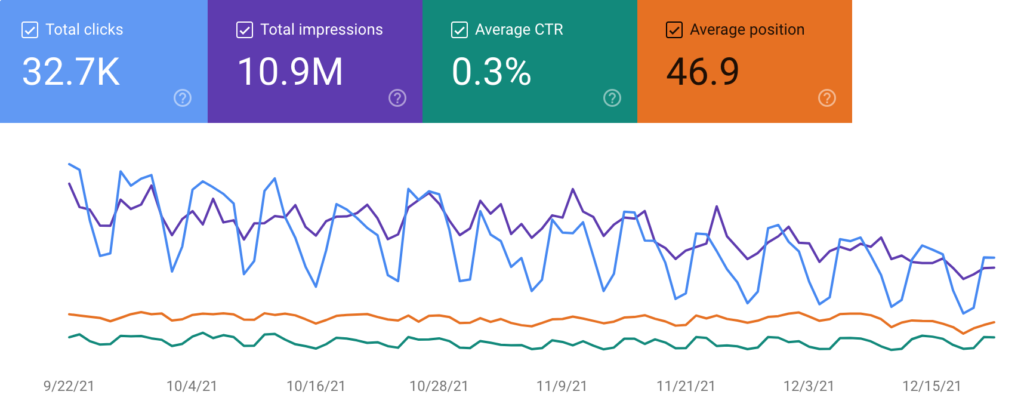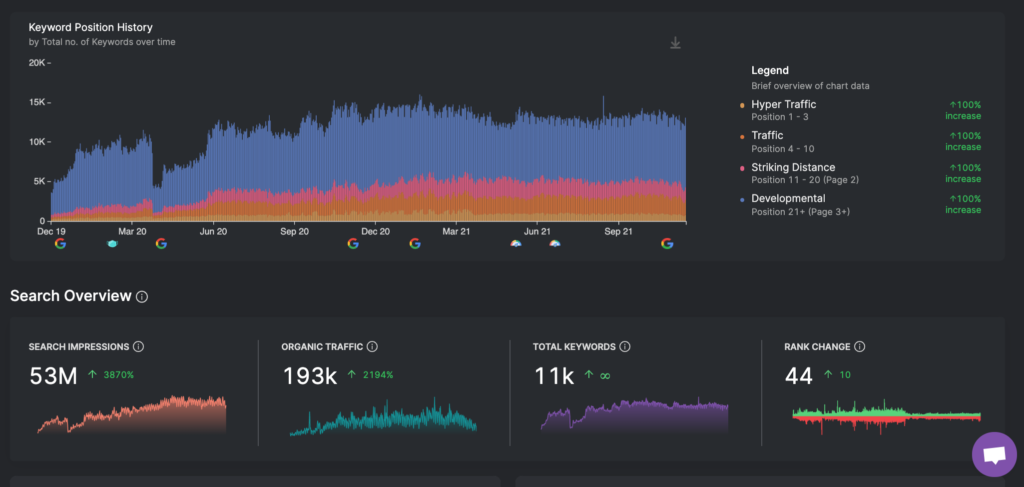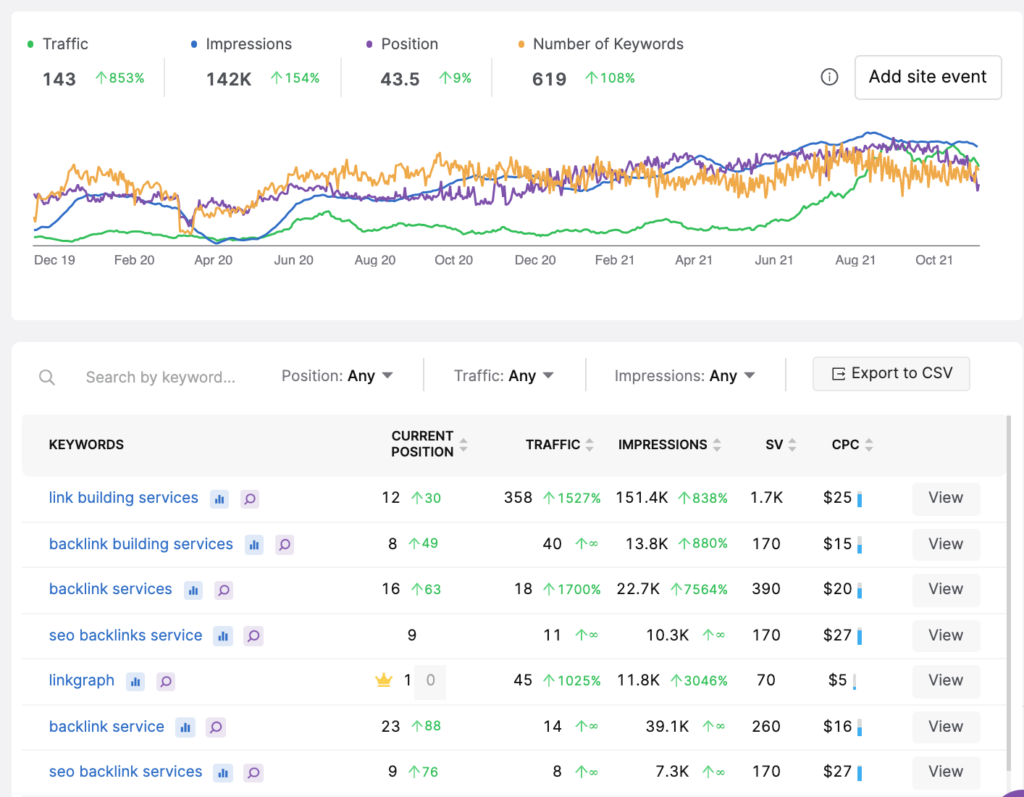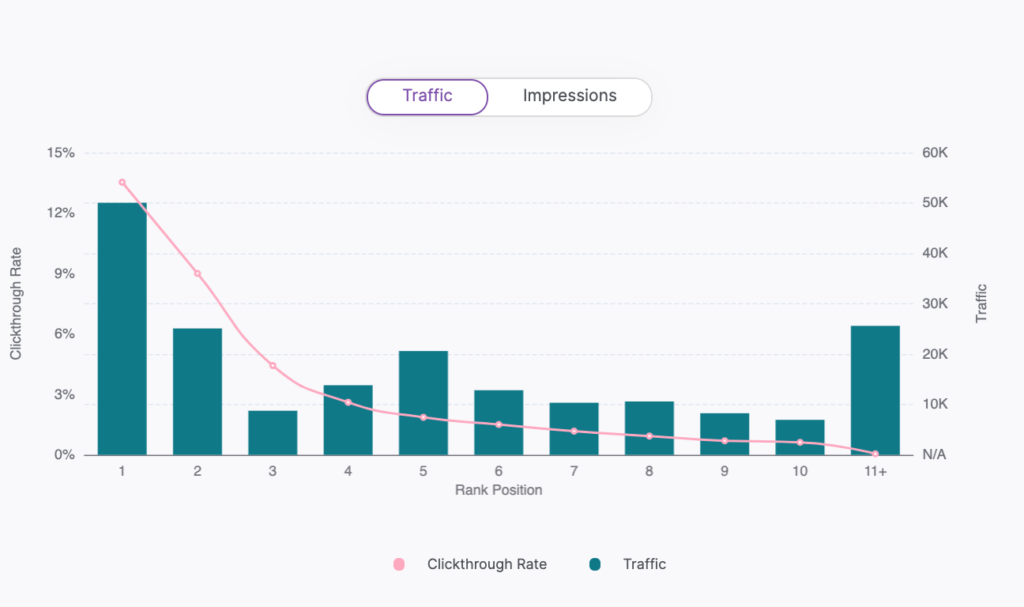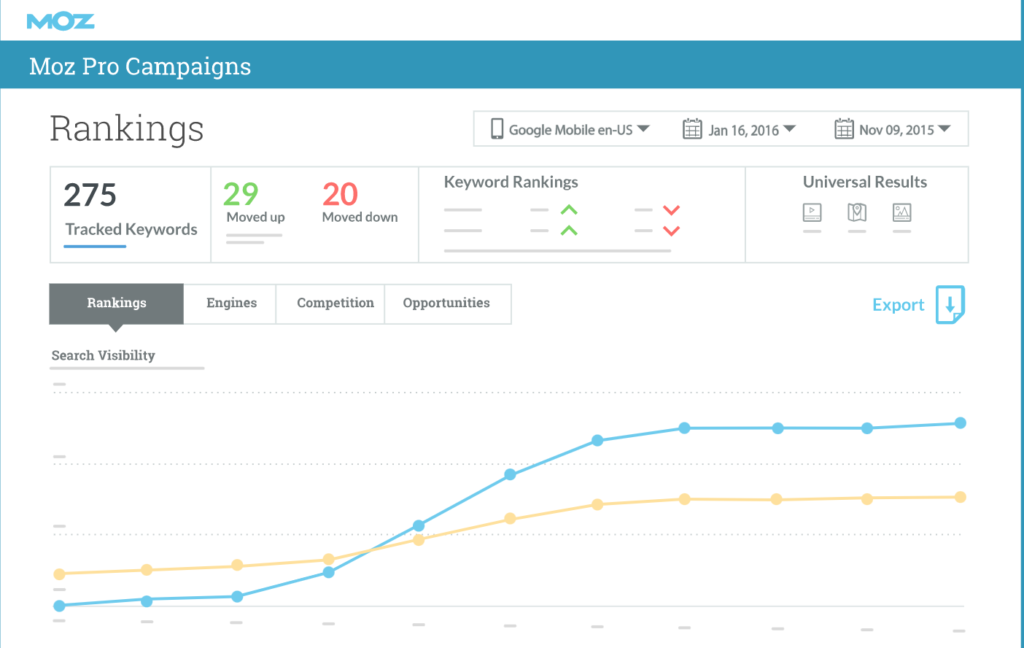Keyword Tracking: How to Choose a Rank Tracking Software
What makes for a quality keyword tracking software? Here’s what webmasters need to know about keyword tracking and rank tracking tools.
We all know the importance of keywords to a business’s search engine optimization (SEO) efforts. Ranking for valuable keywords in your industry is a sustainable, affordable marketing strategy to boost your brand’s visibility online and drive leads and sales. The process of keyword tracking helps digital marketers measure whether their SEO strategy is succeeding.
Here is a breakdown of the importance of keyword tracking to your SEO strategy, how to choose a keyword tracking software, and some top keyword tracking softwares used by SEO professionals and digital marketers today.
What is Keyword Tracking?
Keyword tracking is the process of using software tools to monitor the organic keywords your website ranks for in search engine results. It also involves tracking the ranking positions for those keywords and monitoring how those rankings change over time.
But keyword tracking is not just about watching your keywords and hoping something good happens. Instead, the right keyword tracking tools will provide important data and metrics that offer insights into how to grow and scale your web presence in Google.
Your ideal keyword goal should be to rank in the number one position in the (SERPs) for the keywords that your target audience is using. However, certain keywords are more competitive than others. Other site owners will try to improve their content in order to outrank your brand.
As a result, you should constantly monitor your ranking fluctuations in order to respond when your ranking positions decrease or when your content stops being promoted entirely.
Why Keyword Tracking Matters to Successful SEO
To understand exactly why keyword tracking is an important factor within a successful SEO campaign, it’s critical to understand how the SERPs work, how target keywords tie into rankings, and the most important keyword metrics you’ll want to monitor.
How Do Search Engines Work?
Search engines work by crawling all the web pages on the Internet and then reading, categorizing, and indexing them into a large database. While there are a ton of different technical elements to a website that can make it easier for the search engine bots to find you, the keywords you include on your web pages help the bots understand the content on your web pages and whether or not to promote them in the SERPs.
Similarly, users rely on keywords when searching for new content or information about products and services. But users don’t always search the same way. There are a variety of keywords they might use to find relevant content. If your web pages provide high-quality information or answers to the questions users are asking, Google is more likely to promote it to users.
How Do Keywords Tie Into SERP Rankings?
As mentioned before, your keywords are ideas and topics that define what your content and web pages are all about. They are a fundamental part of SEO. When used properly, keywords drive organic traffic to your website and can make or break your business.
The more often that you create useful, informative content, the more opportunities you’ll have to get your brand name in front of potential customers by showing up in Google searches for relevant keyword queries.
Common Keyword Metrics
There are a few common keyword metrics that SEOs or site owners use to determine which keywords they want to rank for. They include:
-
- Search Volume: This is the number of monthly searches a keyword receives
- CPC: This is the price advertisers pay per click to target the keyword in Google Ads. High CPCs are a sign of strong conversion potential.
- Keyword Difficulty: The competitive landscape of the keyword. Higher keyword difficulty scores mean more competition to rank.
Site owners often aim to rank for keywords that have higher search volume and stronger conversion potential. A smart SEO strategy will also include keywords that a brand can realistically rank for so they can start ranking and driving clicks sooner.
Types of Keyword Search Intent
In addition to the above metrics, search intent also plays into the value of keywords. Stronger search intent can mean a greater need for rank tracking.
The four ways that SEOs usually categorize search intent are:
- Informational: Keyword searchers where the user is looking for information.
- Navigational: When a searcher is looking for a specific web page or website.
- Transactional: Searchers where the user is looking to make a purchase.
- Commercial: Keyword searchers where the user is looking for information that will help them make a purchase decision
Keyword searches that fall into the latter two categories of search intent are often more competitive because they have higher economic value. For businesses who use SEO to grow sales and revenue, they’ll more likely want to track keywords that fall into those categories.
What Metrics Should I Monitor When Rank Tracking?
Once you optimize your content for your target keywords and publish it on your site, there are four metrics to keep an eye on when rank tracking. They include:
- Total Keywords: This is the total number of different keywords that a web page ranks for in the SERPs
- Current Position: The ranking position of a web page for a specific keyword query
- Average Position: This is the average ranking position of a web page across all of the keywords that it ranks for in Google
- Rank Change: This is the number of positions gained or lost since the previous day or the previous rankings update
By using all of these factors to monitor and track your keywords, you’ll be better equipped to hone in on your strategy and promote successful SEO.
How Often Should You Track Your Keyword Rankings?
Arguably, of any marketing element, keywords are the most volatile and change the most often. So much so, that a keyword’s ranking can change within hours and minutes. This makes it necessary to monitor them often.
But each business is different. The word “often” can be subjective. There are a lot of factors to consider when deciding how to monitor your keyword rankings. Our rule of thumb is the more organic clicks that a keyword drives to your website, the more frequently you should check your ranking position for that keyword.
Why? Because for some keywords, a change in rank position can mean hundreds, if not thousands, of fewer clicks to your website.
For beginner mid-sized businesses and those just getting off the ground in terms of content production, we recommend first giving your content time to be promoted on Google. On average, it can take Google up to 90 days to find, crawl, and index your web pages. If you are only starting out with your content implementation, have some patience.
Until Google has been able to find your page, there won’t be much movement in your rankings, so sit tight. Give the search engine time to crawl and index, and once you have been found, we recommend checking your rankings on a regular basis every week.
But for larger, more established websites, keyword rankings should be checked on a daily basis. Because when a keyword is high-performing (meaning strong conversion-potential), other site owners will dedicate a lot of time optimizing their content to rank on page 1.
Just because you earn a top rankings spot doesn’t mean you’ll stay there.
Getting Started With Keyword Rank Tracking
Just as you wouldn’t jump right into any other part of your content marketing strategy, you’ll need to have a game plan when it comes to your keyword rank tracking. Here are some steps that will help you get started.
1. Determine Your Most Important Keywords
The first step is to decide what keywords are the most important for your business. That list can include keywords driving traffic to your website right now and those keywords that you hope to rank for in the future.
Are you earning lots of organic clicks from a specific keyword? Do you earn more conversions from specific queries? If the answer is yes, you’ll want to make sure your content stays in top positions for those keyword terms.
2. Identify Key Position Opportunities
Although the ultimate goal is always to rank in position 1, this is not always realistic. This is epecially true when vying for the more competitive keywords in your niche. But because higher ranking positions have higher CTRs, just one position improvement for a keyword can mean loads of additional traffic to your website.
So in addition to the important keywords, you’ll also want to identify keyword position improvements that present huge organic traffic opportunities for your website. You’ll have to improve the quality of your content and page experience of the pages targeting those keywords to see changes in position. But, you’ll want to have those keywords clearly identified so you can include them in your keyword tracking.
This is particularly true for SEOs or digital marketers providing SEO services to clients. If one keyword position change produces huge influxes of traffic for a client, you’ll want to make sure you show it in your keyword tracking reports.
3. Choose a Keyword Rank Tracker
What rank tracker you choose will depend on the features that are most helpful to your own SEO strategy. Not all keyword rank tracker tools have the same accuracy or features. That’s why you’ll want to make sure that the software you ultimately choose provides the ranking data you need to stay on top of your keyword rankings and positions.
What Makes a Quality Keyword Tracking Software?
Remember, you want your keyword tracking software to work for you. So for the best results, the best rank tracker should include the metrics and functionalities you need in an easy-to-find place. The tool should also provide easily comprehensible data.
When looking for a rank tracker tool, you’ll want to ask yourself the following questions to ensure it is a good fit for your needs:
- Does this software track 100% of your site’s keyword rankings?
- How often are the keyword positions updated?
- Do I have to pay extra for tracking more keywords?
- Does the software include historical data so I can see all keyword positions since Google first indexed pages on my website?
- Does the software allow me to generate keyword reports, and are they helpful?
- Are there metrics to help me estimate how my rank changes will impact my organic traffic?
- Can I track rankings for different countries or geographic areas?
- What’s the total number of keywords that I track at once?
- Can I monitor my direct competitor’s keyword rankings and performance?
- Can I set up alerts for my most important keywords?
Most Important Rank Tracking Features
You might not be able to answer yes to all of those questions based on your current keyword tracking software.
However, there are some absolute musts that you will want to prioritize in order to do keyword rank tracking in the most impactful way.
1. Number of Keywords
For small businesses with only one primary service or product, you may not need a rank tracking software that provides position tracking for every single keyword your website ranks for.
But for enterprise organizations or digital marketing agencies, having 100% of your keyword data can be the difference between proving the value of SEO efforts to key stakeholders or clients.
Not all keyword tracking software provides comprehensive keyword tracking, and some charge higher prices for more additional keywords. Make sure you choose a software that provides access to as many keywords as possible.
2. Daily Position Updates
Imagine this experience. Your keyword tracking software states your web page is in position 4 for a high value keyword in your industry. But then, when you type that keyword into Google, your page is showing up in position 11?
That’s likely because your current keyword tracking software doesn’t have daily position updates. Some keyword tracking softwares only provide daily updates for keywords with higher search volumes, meaning keyword position data can be backdated by weeks, and sometimes even months.
If you are in a highly competitive market or a niche industry with keywords with lower search volume, delayed position updates can be very problematic and prevent you from responding to rankings drops promptly and effectively.
3. SERP Scraping or Google Data
The above two features are predicated on one primary factor: Whether your rank tracking software uses SERP scraping to gather data or uses Google’s API.
Some keyword rank tracking software uses bots to scrape the SERPs and gather position information. Most of these softwares don’t have the capability to scrape the SERPs for every keyword every day.
Google, however, has the most complete keyword dataset in the world. If your keyword tracking software is using Google data, that means you can see more keywords and see changes on a daily basis.
Keyword Tracking Tools for Site Owners
Based on the above features, here are three different rank and position tracking tools that meet most of the above criteria. They vary from completely free to a higher price point. But they offer a range of features that empower site owners to make the most of keyword rank tracking.
Google Search Console
Google Search Console is the original keyword tracking software. This free platform gives site owners a nice introduction to keyword tracking and its importance to SEO.
In addition to keyword tracking, this platform helps site owners troubleshoot page experience issues. You can also use it to monitor mobile usability, submit disavow files, and see your backlinks.
Best Features of Google Search Console
- The World’s largest SEO dataset: No other rank tracking platform has as much keyword data as Google. If you want to see every single keyword your website ranks for – this is the place to do it.
- Impressions Data: An impression happens every time a user sees your SERP result, even if they don’t click on it. Not all keyword tracking softwares include impressions data, but they can be a useful metric for benchmarking your SEO strategy.
- Daily Updates: Google updates keyword rankings data for your website on a daily basis. If there are any rankings changes that might significantly impact your site traffic, you can know almost immediately with this free platform.
Unfortunately, Google’s keyword tracking platform isn’t the most user friendly and is pretty bare bones in terms of UI/UX. It is free, after all, so it’s no surprise that there are no advanced features here.
But in terms of accuracy and real-time position information, nothing can beat the power of Google’s platform.
GSC Insights by Search Atlas
Ideal for enterprise websites and agencies, GSC Insights is one of the most comprehensive keyword tracking platforms. Because the tool is built over Google’s API, it provides the same daily updates and data as Google Search Console, but with more advanced features and data visualizations.
By linking GSC Insights with your Google Search Console account, you can have a fresh look on your keywords ranking data. The data representations that GSC Insights includes help you not only track your keyword rankings, but make insightful decisions for improvement.
In addition to daily updates and full impressions data, GSC Insights also has these additional features.
Best Features of GSC Insights
- Total Keyword History: See the total keywords your website has ranked for overtime. Although Google Search Console tells you all your data, it doesn’t chart total keyword rankings, only total clicks and impressions.
- Overall Rank Change: Shows you the total number of position changes across all of your keywords. This is a great feature to see the impact of sitewide optimizations like link building or page experience improvements.
- Full historical Data: GSC Insights charts all of your historical keyword data for a web page in one easily viewable chart.
- Traffic and CTR by Rank Position: This feature can help site owners identify which keywords have the most untapped organic traffic. This feature shows average CTR and total organic traffic by position, meaning all of the keywords where your web pages rank in position 1, position, 2 and so on.
- Keyword Cannibalization: Sometimes, you may have multiple web pages that rank for the same keyword. This happens when Google doesn’t know which page to promote. This feature identifies which pages are cannibalizing each other so you can resolve it.
For those who really want to leverage the power of keyword data to improve their SEO, GSC Insights is the ideal platform for position tracking. With various subscription levels, site owners and digital marketers can find the level that fits best for their team.
Moz Rank Tracker
Moz’s Rank Tracker offers a very simple and straightforward keyword rank tracking platform. For non-SEOs or beginners to keyword tracking, Rank Tracker offers only the high-level metrics you absolutely need to understand whether your SEO performance is improving or not.
However, because Moz relies on SERP scraping to gather keyword ranking data, they only offer 300 keywords to track, and upcharge for an additional 200 keywords. As a result, this rank tracking software is a better option for smaller sites or local businesses with less robust content or keyword goals.
Additional Features of Moz Rank Tracker:
- Easy On-Boarding: Get started with Rank Tracker quickly with an easy on-boarding process to start tracking your keywords
- Multiple Search Engines: If your brand is also focused on performing well in other search engines besides Google, Moz Rank Tracker provides keyword rankings and positions data for Bing, Yahoo, and Google Mobile as well
- On-Demand Daily Keyword Checks: For an additional cost, Rank Tracker provides additional on-demand query checks so you can see the positions for the keywords that are most important or relevant to your strategy right now.
Conclusion
Every site owner executing an SEO strategy should be engaging in regular keyword tracking. Staying on top of keyword positions can be the difference between maintaining your organic web traffic or losing out on significant sales or lead generation.
All of the above keyword tracking softwares have trial versions of their tools so you can see which one is the right fit for you business or SEO strategy. When done well, keyword tracking can help you achieve more success and maintain your top positions well into the future.














































































